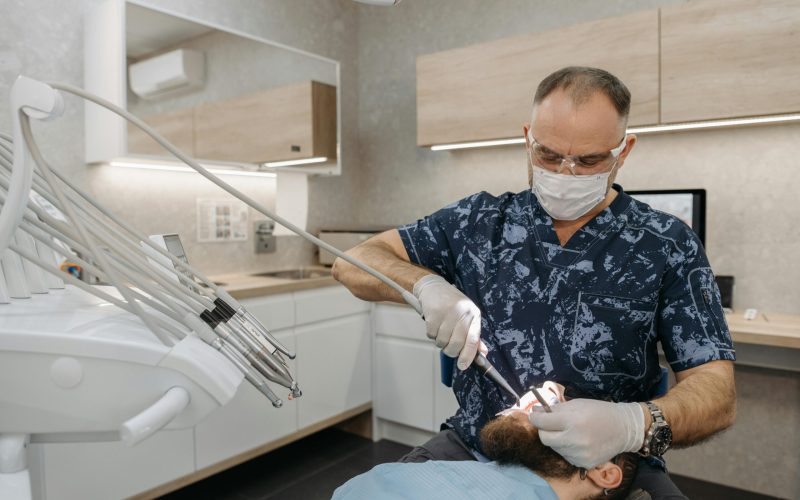The chaos of the COVID-19 pandemic has caused legal professionals to revisit some of what we thought were constants in the divorce world, one of those being that medical professionals had “guaranteed” income. For many professionals, their practices came to a halt in the midst of the global pandemic. Radiologists had fewer images to review, orthopedic surgeons had fewer knee surgeries to perform as their patients lived with pain while waiting for access to outpatient “elective” procedures, and suspension of routine procedures like vasectomies brought urological practices to a near standstill.
This standstill extends beyond the hospital: your smiles have taken a back seat, too. The workload of dentists has been significantly reduced as they only treat emergency matters. Practitioners have also been at the mercy of PPP loans and, for many, that means furloughing dental staff.
This pandemic came at a time when marketing and competition in dentistry made guarantees of financial success with a DDS behind your name a thing of the past. Years ago, graduation from Dental School was seen as a ticket to a four-day work week and good tee times. With the industry now inundated with heavy marketing and lead-generation companies, dentists must become business managers instead of focusing just on their medical craft.
Still, the divorce rate among dentists is higher than the national average
Despite these market challenges—or perhaps because of them the divorce rate among dentists remains higher than the national average and those divorces are often complicated.[1] This is due to the complications that may arise when dividing a dental practice. The practice itself must be appraised and either sold or equalized in the divorce. The practice may also own real estate and could be attractive to newer dentists eager to expand or buy into an existing client base.
What makes valuing a dental practice unique
What makes dental practices different from other medical practices is the salability factor. In theory, this marketplace mentality makes valuing the practice easier. After all, isn’t it worth what someone would pay for it, like the value of a used car? Not necessarily in the realm of divorce. The reality is that the practice may be worth an amount significantly different from the broker’s value, which was based on different factors than those used by the courts.
Dentists, perhaps more than any other group of medical professionals, rely on their reputation and patient experience to secure business. The better the reviews, the better the business. So many people fear visiting the dentist, and a pleasant experience is both a relief and a high likelihood that the patient will return to the same office, or dentist, for future care. Hopefully, that same patient will introduce the dentist to their friends or colleagues. This phenomenon is often referred to as “good will.” Good will may be attached to the dental office or to the individual practitioner, such that even dentists who do not operate their own practices may have their own good will within the community which can then be assigned a value and divided as an asset.
In Arizona, the good will that a practitioner develops over the course of his or her career is considered when determining the value of a practice during asset division. In Wisner v. Wisner, the Arizona Court of Appeals laid out some of the factors which courts should consider when determining the existence and value of professional good will. These factors include the practitioner’s age, health, past earning power, reputation in the community for judgment, skill, and knowledge, and his or her comparative professional success.
A dentist who has performed quality services for a long time may have generated a substantial amount of good will with patients, and that good will may significantly impact the legal value of that dentist’s practice during divorce proceedings.
Evaluators may also consider the practice’s assets and income, which can include contractual agreements with insurance providers, relationships with current patients (particularly when patients require long-term care for endodontic implants, etc.), the average number of new patients that the office treats each month, among many other factors. Some dental practices have passive income from providers who rent space from the dentist to provide collateral services (like an orthodontist who comes in on Tuesdays and Thursdays or an anesthesiologist who participates in dental surgeries as a third-party provider)
In addition, the value of a dental practice may be subject to adjustment because of its locale and the rates of recent sales of similarly situated practices. This means that a dental practice located in North Scottsdale may be more valuable than similar practices in Flagstaff or Tempe. Even ‘non-competition’ agreements with past partners or employees of the practice may be assigned a value for property division purposes.
Equipment, supplies and recurring revenue
While we have seen divorces where the focus of the business evaluation is mostly on the income stream, the business might also have fungible assets of significant value. If an X-Ray machine or other medical devices are owned (as opposed to leased), that equipment needs to be valued.
Some practices are now offering subscription-based services, such as retainers, and insurance products on cosmetic items like veneers. These recurring sources are tremendously valuable because they represent a known revenue stream and passively support the practice. Accordingly, recurring revenue is calculated as part of the value of the practice in a divorce (assuming that the accounts are transferrable).
What do the financial pros say?
We asked Larry Mathis, who is a Certified Financial Planner in Phoenix and the author of Bridging the Financial Gap for Dentists, what advice he would give a dentist dealing with divorce.
Larry Mathis, CFP®:
I have been helping the dental community navigate financial matters for better than three decades. I have helped scores of dental professionals throughout the U.S. develop financial plans based on the things they value most, which incidentally aren’t usually “things” at all, but in reality more the emotional payoffs in life, like peace of mind, and making a difference in the lives of others.
It is always challenging when a client tells me that their marriage is ending in divorce. You asked what advice I’d give them? I remind them that bitterness and resentment in a divorce is only going to benefit the lawyers. Yes, divorce is painful both personally and financially, so they should work to minimize the pain! That means to go through the process with a desire to achieve a healthy resolution that hopefully preserves as much of the family assets as possible. That only happens when reasonable minds (and reasonable attorneys) prevail. The key is to look to the future and focus on the best outcome for everyone involved. As difficult as divorce as it’s important to know what is really important. Of course, an equitable financial outcome is one goal, but so should be the emotional well-being of the people involved.
With this in mind there are some additional practical items that need to be addressed. First of all, it’s vital that everyone involved know the answer to these three questions:
- What do we own? (Assets)
- What do we owe? (Debt)
- Where does the money go? (Expenses)
Candidly, these are questions that every couple should know the answers to during the entire marriage, but let’s be realistic: that is rarely the case. However, during a divorce, answering these questions is vital. It’s also very important that not all assets, debt and expenses are equal. For instance, Individual Retirement Accounts (IRAs) are not all taxed the same. Traditional IRAs are tax deferred vehicles, and distributions will be taxed when the money is taken out of the account. Roth IRAs distributions however are tax free. Essentially you need to know the tax status of all assets, a $100,000 taxable account is worth less than a $100,000 non-taxable account. The same can be said for debts and expenses, as some receive more favorable tax treatment.
My best advice is that both people involved in a divorce should get guidance from a Certified Financial Planner during the process, making sure they have ALL the pertinent financial data. An hour or two spent with a Certified Financial Planner is time well spent. A qualified planner can help educate a person, and possibly bring a quicker resolution to a divorce. Saving everyone involved time, money and heartache.
What do the business lawyers say?
We asked Ben Himmelstein, a business attorney in Phoenix with Radix Law:
Ben Himmelstein:
I have represented many dentists and other medical professionals throughout my career in a variety of contexts – from practice purchases and sales to litigation over various practice issues. I am also (luckily) married to a dentist, so I get to witness practice issues first-hand. Gone are the days where dentists could simply practice dentistry. Now, they are asked to wear so many different hats – not just performing dental procedures – but also running a business. In fact, across the country, there has been an uptick in dentists pursuing advanced business degrees, like an MBA. This seems to stem from increased competition in the industry, as well as the introduction of Dental Services Organizations into the fold.
As though practicing and business operations were not stressful enough, adding divorce into the mix would make anyone feel overwhelmed. Dentists dealing with marital challenges really need to be able to compartmentalize their personal lives in order to ensure that it does not interfere with their professional judgment and clinical practice. Recently, a partner in a dental office was running a very successful practice but became embroiled in a messy divorce. Of course, due to the expansive nature of the divorce, the dentist’s partner was foisted into the middle of the mess. The future ex-spouse served subpoenas during practice hours, requested overly extensive financial disclosure, and sought information irrelevant to the proceedings. This drama created an unhealthy and unproductive environment for both of the doctors and their staff.
The best way to avoid issues like this is to have clear provisions set forth in the practice’s Operating Agreement regarding how to handle divorce by one partner. This could include a valuation formula for the practice, a spousal waiver that the ownership interest is sole and separate property, and provisions regarding restrictions on transferring ownership interests.
Leslie Satterlee is a Family Law attorney at Woodnick Law, PLLC in Phoenix. Her practice focuses on complex asset driven divorce matters including medical and dental practices. Leslie can be reached at [email protected]
Larry Mathis, CFP® has helped countless dentists manage their financial affairs. Larry can be reached at [email protected]
Ben Himmelstein is a lawyer in Scottsdale who has helped medial practice owners navigate complicated legal decisions and business divorces. Ben can be reached at [email protected]
[1] https://www.dentistryiq.com/practice-management/practice-transitions/article/16352788/divorce-and-dentistry-why-is-rate-of-divorce-high-among-dentists-and-how-can-they-avoid-it-part-1



